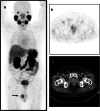Isolated Testicular Metastasis from Prostate Cancer Detected on Ga-68 PSMA PET/CT Scan
- PMID: 33282004
- PMCID: PMC7704875
- DOI: 10.1007/s13139-020-00673-4
Isolated Testicular Metastasis from Prostate Cancer Detected on Ga-68 PSMA PET/CT Scan
Abstract
Although prostate cancer can metastasize to any part of the body, isolated testicular metastasis is very rare and only few cases have been reported so far. Here we present a case of 65-year-old male patient, known case of prostate adenocarcinoma, referred for 68Ga-PSMA PET/CT scan, post radiotherapy, and androgen deprivation therapy, for rising serum PSA levels. He was found to have an isolated testicular metastasis on the scan. This report highlights the importance of 68Ga-PSMA PET-CT scan in detecting these unusual and rare sites of metastasis from prostate cancer.
Keywords: 68Ga-PSMA PET/CT; Adenocarcinoma prostate; Testicular metastasis.
© Korean Society of Nuclear Medicine 2020.
Conflict of interest statement
Conflict of InterestDr. Nitin Gupta, Dr. Sudip Dey, Dr. Ritu Verma, and Dr. Ethel S.Belho declare that they have no conflicts of interest. There is no source of funding.
Figures



References
-
- Silver DA, Pellicer I, Fair WR, et al. Prostate-specific membrane antigen expression in normal and malignant human tissues. Clin Cancer Res. 1997;3:81–85. - PubMed
LinkOut - more resources
Full Text Sources
Research Materials
Miscellaneous
